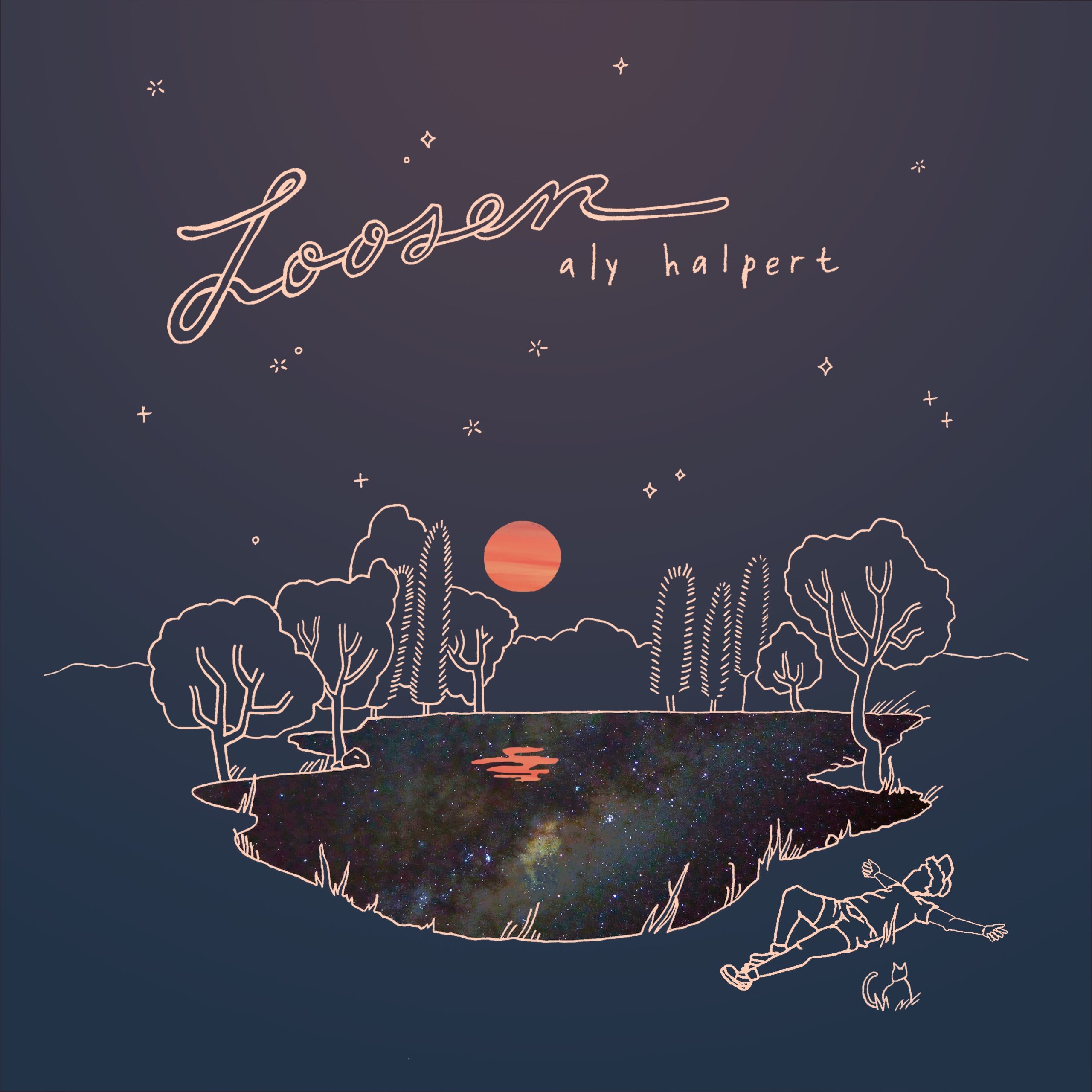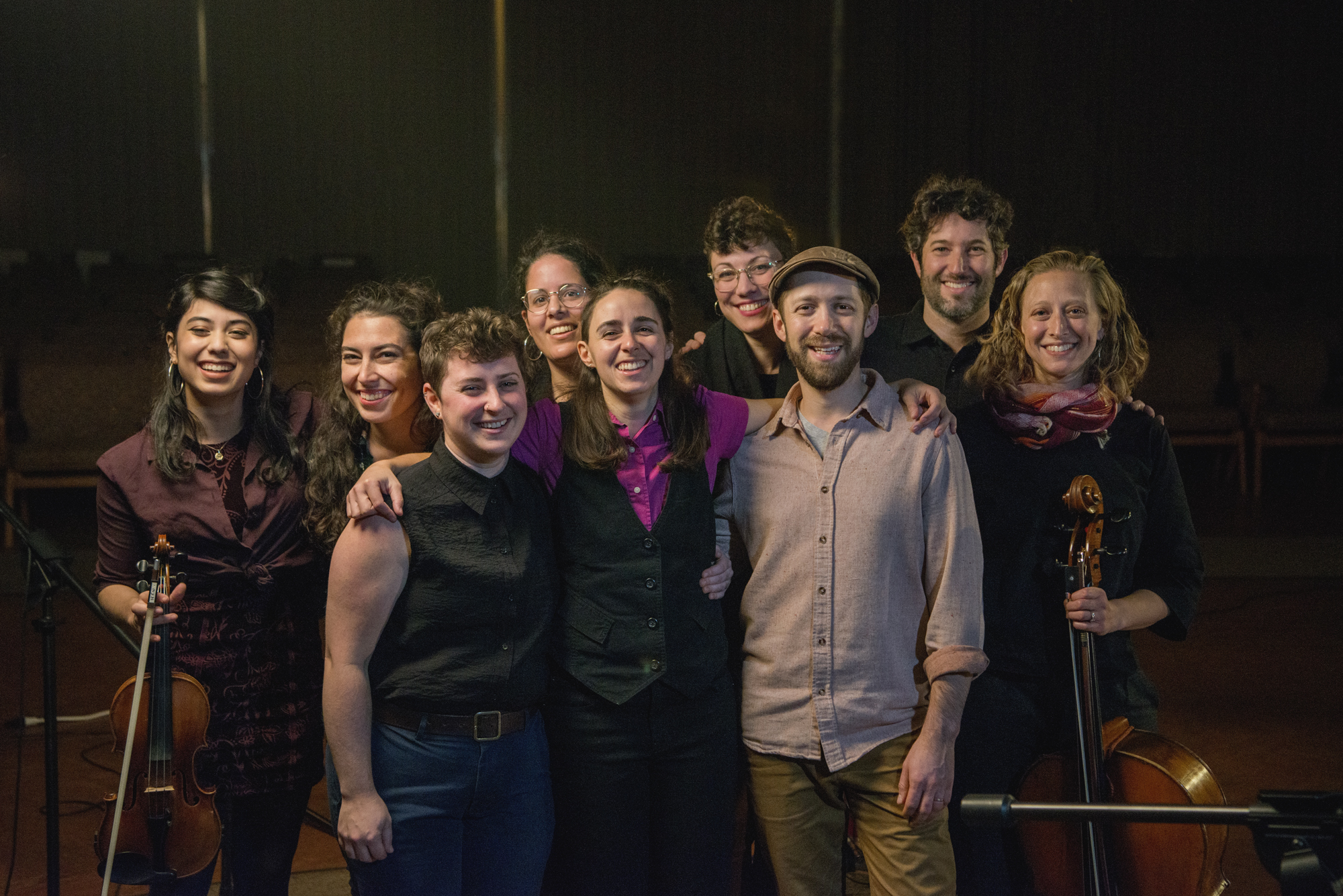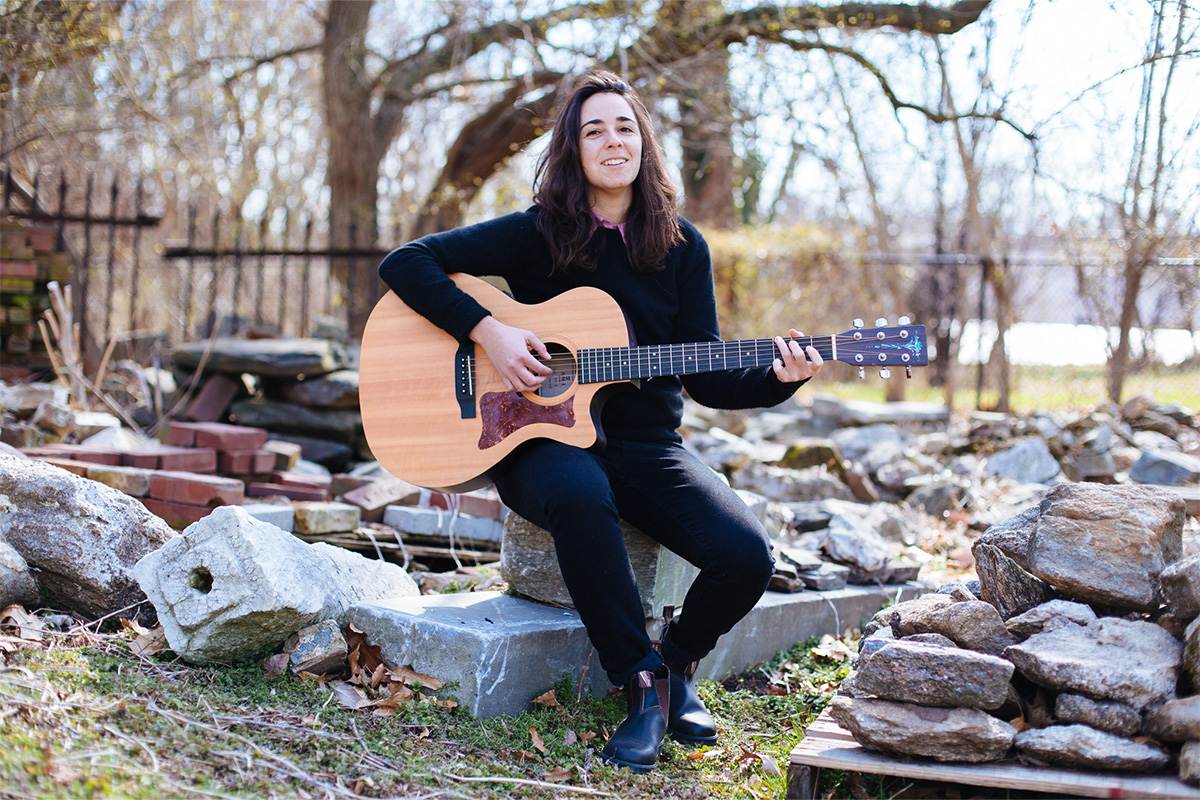What does queer Jewish music for the community sound like? Aly Halpert’s most recent album, “Loosen,” released April 11, is a true reflection of her identity, her family and her friends. Aly is a musician and activist based in Philadelphia, PA on Lenni Lenape land, whose music reflects a deep passion for healing and encourages listeners to build the world that we want for ourselves. Halpert’s music made me feel like I was being warmed by a campsite fire, wrapped in a blanket. It is simultaneously folky and ethereal, contemplative and celebratory.
Halpert released this album in collaboration with Rising Song Records, which aims to “cultivate Jewish spiritual life through song.” Co-produced by Joey Weisenberg, “Loosen” features three days’ worth of live recording at the Germantown Jewish Center in Philadelphia, PA, thanks to the fundraising support of over 300 people.
Since recording this album, Aly says she feels more in her power as a bandleader and artist — she tells me she “feels taller.” This is due both to the support of her community and friends and to Weisenberg’s mentorship. “Loosen” was crafted with love, through rock-solid friendship and community, and serves as its own sort of support system for listeners. Its title track has traveled and been sung around the world. “It’s been humbling to see how the song resonates with people, and to see how much we need healing music in this time,” says Halpert.
I was able to speak face-to-face (over Zoom) with Halpert to dive deeper into what this album means to her and to the Jewish community — and beyond.
This interview has been lightly condensed and edited for clarity.
CW: suicide.
How would you describe yourself?
I describe myself as a musician and activist whose songs are both serious and silly about healing and building the world that we want. My music, on this album… I wrote something that feels captured. The songs feel like they kind of run the range from being folky to raw and spiritual to more sometimes even pop-y. Like… ethereal to celebration. Yeah.
What is your musical background?
My family had a piano in our house growing up… One of my earliest memories is just banging on it and being like, this is making sound. It’s just like the coolest thing. I grew up taking piano lessons and singing in choir. My background is not super professional until recently, like the last four or five years. I didn’t grow up with musicians in my family, really, but everyone likes to sing. I did grow up playing piano and saxophone and learned guitar in college.
Who would you say that you draw musical inspiration from?
I think my biggest musical inspiration comes from the world that I want to see and just wanting to write music that serves individual and collective healing, and serves the people and the communities in my life. I’m inspired by a lot of different musicians, a lot of people in my same cohort of musicians, like Joey Weisenberg and Batya Levine… my friends. I feel really lucky to be in a time right now when Jewish music is exploding in such a huge way. I started getting into Jewish music when I did Adamah, which is this Jewish farming program in Connecticut. And also, at the same time that that happened, Let My People Sing was being started and Linke Fligl (“a queer Jewish chicken farming cultural project”) was being started — all these Jewish projects made by Jewish young adults. It’s been a really inspiring time to come into being a musician and to hear peers constantly making music — music that’s for the purpose of singing in community and for the purpose of protest and prayer and social change. And also just healing.
Could you tell me a little bit about what your songwriting process looks like?
It definitely varies by song. When I wrote “Ashrei,” which is the first song on that album, it was about to be Sukkot. My friend Margo was like, “We need another tune for Ashrei.” And they like to joke: “I’m gonna send you to your room, and don’t come out until you have the tune for this thing.” And so I got sent to my room. And then I came out of my room and had that song. Sometimes it’s like that, and sometimes it’s just like, the song comes to me in a moment. And that’s also a really helpful and special thing. That happened with “Loosen,” which is the album’s title track. My brother died by suicide in 2017. And it was about a month after that, and I was having a really hard day and doing some stretches on the porch of the camp where I was working, and those two lines just sort of came to me — pretty much in the way that ultimately became the song.
I also love to work with young people to write their own songs — and, especially, to work with young people to write songs about climate change. If you ever get a chance, you should check out the Jewish Youth Climate Movement, because they’re starting to record an album.

What is your intention with this album specifically? And what is your intention with your music generally?
I think the main purpose of this music is to reach people who feel numb or hopeless or powerless about the way that the world is right now. I know a lot of people who are really struggling, and I think it’s easy to feel like our struggles are individual when they’re not. Oppression and racism and classism and antisemitism are the reasons why we’re struggling, you know, among lots of other kinds of oppression. I hope this music makes people feel less alone. I think there are different ways that it does that: Some of the songs are directly about healing, and some of them are about celebrating and resilience, about being whole and celebrating that, and envisioning different possibilities for how things can be instead of the way that they are right now… which is not particularly great in this moment.
How does your identity inform the music that you’re making?
I would say this album really was born out of queer relationship and community. I felt super supported by both my queer family and my family of origin in making this album, but particularly by just getting to call one of my best friends, Molly, every single time I had to make it through the next stage of the fundraising or think through a question. And Batya, who had just done a really similar album and recording experience — just to be able to be like, what do I do about budgeting and arranging this thing? And living at Linke Fligl in Millerton, I had a small pod of, like, four of us that were really hunkered down for most of the pandemic together. And I couldn’t have made this album without them. Yeah. I’d say queerness. For sure.
Could you talk a bit about how your Jewishness and your musicality are intertwined?
This album is a collection of songs that I’ve written since 2016. So it’s kind of a long time range. And they’ve all come into being since getting to dive into a thriving Jewish, queer, young adult culture. And it feels really bound up in a Jewishness that’s about deep ritual at the same time as deep liberation theology. And yeah, I’d say [in] some of the songs that connection is obvious, that it comes from different Jewish texts that have been inspiring to me. But yeah, I’d say that on this album in particular, that’s present in every song.

Is there anything else that you want to share?
I worked with a dream team. My high school best friend was on the album, who’s the person I learned to sing with originally. And I’m also on my own journey with this music and the message that it has. I think that it’s really hard sometimes for us as Jews to believe in joy, and to believe in our worthiness to have joy. And I think I’m also trying to soak in that message via putting this music in the world. I don’t know, it’s just wild that over 300 people supported this project and want this music in the world. I’m still super humbled by that, and still thrilled to be getting to do music in the world. So I think I’m also taking in the messages about abundance and goodness that are part of the album.
Halpert is on tour as of April 30th with Batya Levine and Arielle Korman, playing songs from Halpert’s album “Loosen” and Levine’s album “Karov” as well as original music from Korman. You can find more information, tickets, and dates here.



